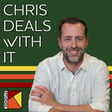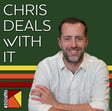Become a Creator today!Start creating today - Share your story with the world!
Start for free
00:00:00
00:00:01

EP 70 - Year, Quarter, Week, Day
For the first episode of 2025, I’m reviewing the year, quarter, week & day technique I use for structuring my time & objectives.
For more info & to download a free PDF of today's episode notes, visit: http://www.chriskreuter.com/CDWI
Join the Kreuter Studios mailing list: https://mailchi.mp/810367311f3d/ksb
Recommended
Transcript
Frameworks for Overcoming Challenges
00:00:08
Speaker
On Chris deals with it, I talk about the frameworks and methods I use to clear personal, creative, and professional roadblocks. My goal is to help others bridge the gap between where they're at now and what they want to achieve. If you're new to the show, I'm an engineer, writer, parent, game designer, leader, and reader who leverages that experience to develop creative solutions to problems.
Episode Creation Without AI
00:00:30
Speaker
an AI statement that all elements of this episode are products of the author, Chris Kreuter, and made without the use of any AI tools. Welcome to Episode 70 of Chris deals with it, year quarter week day.
Time Structuring Techniques
00:00:43
Speaker
For the first episode of 2025, I'm reviewing the year, quarter, week, and day technique that I use to structure my time and objectives. So there's four timescales along which I structure my time. The year, I give each year a theme which provides part of the scaffold that underpins my aspirations and targets for the year ahead. Quarters, these four pivot points during the year allow for reflection. They're deep dives that validate progress, alter methods, or reestablish direction.
00:01:10
Speaker
At the weak level, that's where themes, goals, and methods meet the reality of life. Large goals get broken down into concrete actions that become scheduled into a weekly plan. And then on the day level, that's where the magic happens. Time is allocated, reactions are made, and life is lived.
00:01:27
Speaker
So we're going to take these one by one and we're going to start with the year. Often the quietest period of my year is the week between Christmas and New Year's Day. While I'm typically reflective leading into the holidays anyway, it's during this final week where I do a full end of year review.
Reviewing Goals and Principles
00:01:41
Speaker
The review starts with reflection. How did my theme carry through the year? I'll review my goals.
00:01:47
Speaker
Then I'm gonna go through each of my 13 principles one by one, assessing where I'm living in accordance with them and where I'm falling short. Now we did a deep dive of my principles with a long series, ah one episode dedicated to each principle and those were episodes 32 through 45. It's worth noting that my principles have been in place for a long time though. They're core to who I am and who I wish to be in the world. These have proven to be a very powerful guide, regardless of where I'm at or what's going on in my life or what my theme for the year is.
00:02:18
Speaker
Regarding that theme, each year I develop a theme for the upcoming year. The theme tends to be a single word, an overarching approach towards the year. It's not something tied to a specific goal or singular aspect of my life. Themes are intended to be flexible, it's more of a mentality to help adapt to things as they happen during the year.
00:02:38
Speaker
So after reflection and landing on a theme, I usually have multiple pages of notes on things I'd like to do, changes I'd like to make, ideas I want to explore. From here, I get more concrete on planning the year ahead.
00:02:51
Speaker
Now over the past year, I have begun to shift away from a goal-heavy approach. Goals can involve a lot of effort to track. It can make it harder to explore new opportunities that come up during the year, or to react to life changes. It can be daunting when you inevitably fall behind or lose interest in goals that weren't realistic or well-defined.
00:03:12
Speaker
It's really hard to predict what you're going to want to do months later.
Lifestyle-Centered Career Planning
00:03:15
Speaker
Instead, I become much more focused on lifestyle centered career planning, which is a phrase coined by Cal Newport's work and I'll have a link in the show notes. so You really want to identify your desired lifestyle, then work backwards to see how your family, career, skills, education, methods, etc, all need to adapt to migrate closer to that lifestyle. And this helps provide clarity on the why lifestyle decisions are put into clear context.
00:03:41
Speaker
and So when you're clear on what's most important, it's a lot easier to communicate these desires, not just to yourself, but to your family, friends, employers, mentors, etc.
Impact of Seasons on Plans
00:03:52
Speaker
So let's look at that next time scale, the quarter. So in a 52-week year, we're gifted with quarters of 13 weeks each, and fans of the show will understand my obsession with number 13. Each quarter has unique features, ah weather, amount of daylight, holidays, opportunities, and these create unique mental, physical, and emotional landscapes. Now I live in the Northeast United States, so my quarters are probably gonna be different than yours, but for me, the first quarter, January through March, these days are short on daylight and there's a chill in the air.
00:04:22
Speaker
There is a tendency to spend more time indoors. Plans have a higher potential to be altered by weather. The patterns here are fewer events to travel to. The lighter calendar lends itself to consistency of progress on personal and professional tasks. There is a tendency towards less exercise, fewer walks to aid thinking. And if you live with family, you may have less solitude. If you live alone, you might have more solitude.
00:04:47
Speaker
The second quarter, April through June, spring brings a sense of renewal. It's a world refreshed with and budding with possibilities. People come out of hibernation-like mindsets, uncoiling lots of energy and creating momentum. The patterns here is that there's much more physical activity, more time outdoors, days getting longer, nature's in full bloom, vibrant colors, more animal activity, more visual variety.
00:05:11
Speaker
Springtime for many comes with religious and spiritual high points. Easter, Passover, Ramadan, Visakh, Holi, and many more. Q3, that's July through September. So these are long, warm days that gift early risers with actual sunlight. Early morning walks, beach vacations, long afternoons and evenings outdoors. The patterns here can be a tendency for more activities and commitments on your schedule. The longer hours provide more opportunities for exercise and being outdoors.
00:05:41
Speaker
For those with kids, summer can create logistical challenges with school out of session. Depending on your field, the summer months can also have a slower pace due to vacations and more languid attitudes.
Quarterly Review Process
00:05:52
Speaker
In Q4, this is October to December,
00:05:55
Speaker
The winter months feature plenty of color outdoors and festivities galore, Halloween, Thanksgiving, and the holiday season. The patterns here are more gatherings of family and friends, potential for lots more travel. There's a tendency for things to get very frenetic with get-togethers, sports, gift-giving, holiday parties, to the point where it can get pretty overwhelming, and all this activity tends to create less consistency in routines.
00:06:19
Speaker
So given these unique patterns and feel to each of these seasons, these natural breakpoints in our year are great opportunities to take a pause and dive deep into where we're at. Now I'll typically do this during the final days of each quarter, which would be March, June, September, and then my end of year review anyway. And I'm going to go through the following steps. I'm going to review that previous quarter. Did it go as planned? Were there any major shifts or changes that I need to account for going forward?
00:06:45
Speaker
I'll go back and review the year's theme. How's it been going? How should it be adapted in the quarter ahead? Occasionally I've gone so far as to create a sub-theme as specific to that quarter that really wants me to highlight not a specific aspect of my life. I will update my yearly goals. Am I on pace to complete what I set out to do? I'll do another review of each principle one by one. Am I living in accordance with them? What shifts do I need to make to align with them better?
00:07:12
Speaker
um I'll review the key elements of my life management, my budget, task lists, project statuses, health, et cetera. Then I'm gonna do a detailed layout of the 13 weeks ahead. I'm gonna review the commitments that are already in my calendar, what might happen, and I'm gonna label each week, is it gonna be calm, busy, or hectic? And based on the reality of how those weeks are looking, I can better manage expectations when I'm managing my life at the weekly time scale.
00:07:37
Speaker
So let's look at the weekly time
Planning and Accountability
00:07:39
Speaker
scale. As time management gets more granular, the amount of time needed for reviews and reflection tend to decrease. My weekly review takes usually less than an hour. I'm empowered by a theme. I'm clear on my plans and goals. I'm focused on the methods and assets that are available to accomplish things in life.
00:07:58
Speaker
So at the weekly level, it's all about planning and accountability. I'm going to go back to that timeline I said at the beginning of the quarter, and I'm going to look at that the week ahead and the next two or three weeks. Is it going to be a calm, busy or hectic week? Do I need to get more done in the week ahead in anticipation of hectic times to come? Or do I need to be realistic that less will get done because the week ahead is going to be crazy?
00:08:19
Speaker
I will have a family meeting. I'm gonna ensure that my schedule is aligned with the family's needs, and that I have to react to their needs as well. I'm gonna do a quick check on the projects and my task list. What elements of these should be completed in the week ahead? There's also a reconciliation of bills, my financial plan, random notes and ideas, both physical and digital, that have been piling up during the week. I'm gonna clean up all the catch-all places that I've created to act as a second brain during the churn of the day-to-day.
00:08:48
Speaker
It's really important to have a consistent breakpoint to your week. There's no rule that says your week has to start on a specific day. At one point, I was doing this every Sunday afternoon, but I found that this would often get interrupted or pushed ahead in the Monday due to family plans. A few years ago, I switched to Friday early afternoons. It tends to be the quietest part of my work week, and I like to get it done before I pick up the kids from school.
00:09:13
Speaker
And starting my weeks on Saturday is awesome, since it gives me two complete days, typically free of work commitments, to make progress on personal and creative goals. I have bandwidth to think carefully and calmly about major events coming in the weekdays ahead, challenges I may encounter, opportunities that might arise, et cetera.
00:09:31
Speaker
As important as that consistent breakpoint is, I still need to be flexible. If there's a long holiday weekend, travel interruptions, whatever, I've got no problem shifting the review to Thursday or over the weekend. The weekly timescale doesn't always have to be seven days precisely. And as with all of this, sometimes you just have to react to life, you take it as it comes.
00:09:51
Speaker
Lastly, let's talk about the day.
Balancing Daily Tasks
00:09:53
Speaker
For me, I still enjoy working off of a small, roughly five by seven inch notepad, one sheet with my tasks and goals for the day. And around the end of the workday, I like to create some separation between professional and personal life. I'll review my work inbox. Is there anything pressing that should have been taken care of?
00:10:10
Speaker
um Is there anything that I need to make sure is on my to-do list for the next day? I'm going to do a quick check of my weekly plan. I'm going to write out the following day's to-do list. For major tasks, I'm going to block out focus time on my calendar to work on them, leaving some wiggle room between meetings or mandatory tasks whenever possible.
00:10:28
Speaker
I'm gonna double check my calendar, see if anyone has a birthday or anniversary coming up. And this practice has been a wonderful way to keep up with friends and loose ties from over the years. Now I keep these dates as recurring yearly events on a Google Calendar that's separate from my main schedules and calendars, but it's visible as an additional layer. And I tend to really love Notion Calendar and Google Calendar for these. I'm gonna leave room in the following day's schedule for unscheduled, unplanned tasks.
00:10:55
Speaker
There's usually a careful balance. It's somewhere between planning down to every minute and completely freewheeling my days. Now during the weekends are on vacation, a much more lax regarding time blocking in my to do list. Even though it's less structured, I tend to always have a list covering what I want to get done over that time. I try to be as realistic as possible given the events that are going on in my weekend or vacation.
Engagement and Resources
00:11:17
Speaker
Are you curious about my personal theme for 2025? If you are, please sign up for my once a month newsletter. That's where I tend to create more personal and creative updates. Now, January 13th's newsletter is gonna highlight the what and why for this year's theme. I'm gonna end today's episode with a quote that's courtesy of the theoretical physicist Richard Feynman. You're under no obligation to remain the same person you were a year ago, a month ago, or even a day ago. You are here to create yourself continuously. And with that, have a great day.
00:11:56
Speaker
If you feel that Chris dealt with it, I'd appreciate your support of the show by sharing it with someone who might benefit. Ratings on your favorite podcast player are also helpful in growing the audience. Visit chriscroiter dot.com for free downloadable PDFs with notes and resources from today's episode. Sign up for the CDWY mailing list or to send in your problems or requests for future shows. That's C-H-R-I-S-K-R-E-U-T-E-R dot.com or use the link in the show notes.


